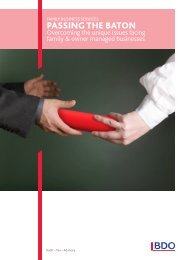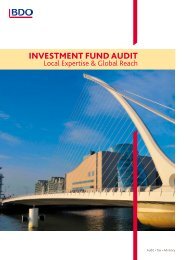The easiest way to double your money - BDO
The easiest way to double your money - BDO
The easiest way to double your money - BDO
You also want an ePaper? Increase the reach of your titles
YUMPU automatically turns print PDFs into web optimized ePapers that Google loves.
<strong>BDO</strong> Simpson Xavier Private Wealth Management<br />
Investment Update — 19.06.2008<br />
<strong>The</strong> <strong>easiest</strong> <strong>way</strong> <strong>to</strong> <strong>double</strong> <strong>your</strong> <strong>money</strong><br />
<strong>The</strong> safest <strong>way</strong> <strong>to</strong> <strong>double</strong> <strong>your</strong> <strong>money</strong> is <strong>to</strong><br />
fold it over and put it in <strong>your</strong> pocket or so Kin<br />
Hubbard opined back in the early 1900’s. In<br />
the current environment, many believe his<br />
advice makes a lot of sense.<br />
A week may be a long time in politics but for inves<strong>to</strong>rs (who<br />
believe they have a long term investment horizon) the last<br />
12 months seems like an eternity. In the early part of 2007,<br />
markets were in a euphoric phase. <strong>The</strong>re were just not enough<br />
investable opportunities around for those with capital. Yet, in<br />
the space of 12 months, with bank coffers nearly $400billion<br />
lighter, commenta<strong>to</strong>rs and analysts are tripping over<br />
themselves <strong>to</strong> get the sound bite that is the gloomiest. On a<br />
daily basis, news bulletins focus on keeping us up-<strong>to</strong>-date on<br />
the annals of gloom. We hear how poorly the s<strong>to</strong>ck market is<br />
performing, how much house prices are falling, how weak the<br />
dollar is and how quickly the price of oil is rising etc, etc.<br />
What does this mean for us<br />
as inves<strong>to</strong>rs?<br />
<strong>The</strong>re is little doubt that global economies are under strain.<br />
Years of low interest rates, cheap <strong>money</strong> and ridiculous<br />
lending practices have led <strong>to</strong> what is now known as the credit<br />
crunch. Credit is available; it’s just that no one wants <strong>to</strong> give<br />
it <strong>to</strong> you. <strong>The</strong> knock on impact of a re pricing of credit and<br />
inves<strong>to</strong>r risk appetite is that many inves<strong>to</strong>rs and investment<br />
banks who <strong>to</strong>ok on <strong>to</strong>o much risk chasing those fantastic<br />
returns, are left holding investments that they did not envisage<br />
holding. Fac<strong>to</strong>r in that these investments are falling in value<br />
daily and suddenly a severe hangover emerges from the party.<br />
<strong>The</strong> buying and selling spree came <strong>to</strong> an abrupt end in the<br />
second half of 2007. So, yes the doom and gloom that we<br />
read in the press is warranted as it is an accurate reflection of<br />
daily events. In addition, inves<strong>to</strong>rs have seen the value of the<br />
investments fall over the last 12 months, but how important is<br />
this as medium <strong>to</strong> long term inves<strong>to</strong>rs?<br />
In our opinion the daily market snapshots from media and<br />
market commenta<strong>to</strong>rs are nothing more than unnecessary<br />
noise that serve <strong>to</strong> give us indigestion. Mindful of the<br />
performance of investment portfolios over the last 12 months,<br />
here are our observations:<br />
1 <strong>The</strong> market is the market.<br />
Benjamin Graham, the legendary inves<strong>to</strong>r and men<strong>to</strong>r <strong>to</strong><br />
Warren Buffet used the metaphor of “Mr Market”. To quote<br />
him, “...[an inves<strong>to</strong>r] should al<strong>way</strong>s remember that market<br />
quotations are there for his/her convenience, either <strong>to</strong> be taken<br />
advantage of or <strong>to</strong> be ignored”. At <strong>BDO</strong> when we meet clients<br />
in almost all cases, clients will have an investment horizon<br />
of 5 years or more. However, in each and every case, the daily<br />
gyrations of the markets cause them concern. Inves<strong>to</strong>rs should<br />
remember that the market is there <strong>to</strong> allow them <strong>to</strong> invest<br />
or liquidate as they see fit. It is also the best estimate of the<br />
collective wisdom of inves<strong>to</strong>rs at a point in time as <strong>to</strong> the<br />
value of any particular company or otherwise. However, just<br />
because someone is willing <strong>to</strong> put a value on an investment,<br />
doesn’t mean that this is the true value of the investment. It’s<br />
merely a value at that point in time that someone is willing <strong>to</strong><br />
pay; is there for our convenience; and more importantly fac<strong>to</strong>rs<br />
in the sentiment of the market of the day. If you have no<br />
intention or requirement <strong>to</strong> sell, then treat it as Ben Graham<br />
advised, <strong>to</strong> be either taken advantage of, or ignored.<br />
2 Inves<strong>to</strong>rs should adapt their investment approach.<br />
Most of us as inves<strong>to</strong>rs have approached our investments<br />
on what at <strong>BDO</strong> we term as a transactional approach. Yes,<br />
our investment advisors <strong>to</strong>ld us we were diversifying but the<br />
reality was that we were simply buying one transaction after<br />
another, typically either a share or great property opportunity,<br />
or so we were <strong>to</strong>ld. Inves<strong>to</strong>rs need <strong>to</strong> take s<strong>to</strong>ck of their current<br />
asset allocations, particularly given the barrage of perceived<br />
opportunities that are available. If we are over exposed <strong>to</strong><br />
one asset class, in the current environment, increasing this<br />
exposure may not be wise. We should use the opportunity <strong>to</strong><br />
put shape on our portfolios by preparing an investment plan<br />
as a roadmap for future investing and start again. <strong>The</strong> evidence<br />
clearly indicates that 91.5% of a portfolio’s return over time<br />
comes from asset allocation rather than security selection or<br />
market timing. Clearly, spending time on asset allocation is<br />
worthwhile.<br />
More importantly though, in the future inves<strong>to</strong>rs need <strong>to</strong><br />
adapt the selection criteria they use <strong>to</strong> assess investments.<br />
Believing that a particular transaction offers value merely<br />
because the price is lower than it was 12 months ago is likely<br />
<strong>to</strong> cost you <strong>money</strong>.<br />
3 Follow the smart <strong>money</strong><br />
It’s al<strong>way</strong>s interesting <strong>to</strong> see what smart <strong>money</strong> is doing in the<br />
current environment. Equity withdrawals by private inves<strong>to</strong>rs<br />
from public equity markets hit a record of $75billion for the<br />
first quarter of 2008, higher than the withdrawals at the height<br />
of the dot com bubble. Over the same period though, private<br />
equity funds continued <strong>to</strong> raise finance and when added <strong>to</strong><br />
what Citibank believe is $500 billion of yet <strong>to</strong> be deployed<br />
capital, clearly there is a lot of capital on the sidelines waiting<br />
<strong>to</strong> be put back <strong>to</strong> work..<br />
Before, we look at where smart <strong>money</strong> is going, we firmly<br />
believe that the private markets will offer significantly more<br />
attractive opportunities than the public markets.<br />
Table A illustrates the returns for private equity versus two<br />
public markets, the MSCI World Index and S&P 500. As can<br />
be seen, the returns from the private markets outperformed<br />
those of the public markets. Over a 10 year period, the private<br />
markets delivered between 10% and 11% versus between 7%
and 8% for public markets.<br />
Table A. Pooled Performance as of 31 December 2006<br />
Investment Type<br />
10 Years<br />
All U.S. private equity* 11.00%<br />
All European private equity † 10.1<br />
MSCI World* 7.6<br />
S&P 500* 8.4<br />
*In U.S. dollars<br />
† In euros<br />
Sources: Thompson Venture Economics; Bloomberg; Standard & Poor’s<br />
But were these returns enough given the illiquidity of the<br />
private markets? Table B, illustrates that there is a large<br />
difference between the best managers in the private markets<br />
and the rest. As can be seen from the table, by investing with<br />
<strong>to</strong>p quartile managers for example, in US venture funds, <strong>your</strong><br />
annual return over the 10 year period would have been 82.7%<br />
versus the S&P 500 of 8.4%.<br />
Table B. Top-Quartile Performance as of 31 December 2006<br />
Investment Type<br />
10 Years<br />
U.S. venture funds* 82.70%<br />
U.S. buyout & mezzanine funds* 22.9<br />
European venture funds † 26.7<br />
European buyout & mezzanine funds † 31.4<br />
MSCI World* 7.6<br />
S&P 500* 8.4<br />
*In U.S. dollars<br />
† In euros<br />
Sources: Thompson Venture Economics and the National Venture Capital Association<br />
Hence, private markets have his<strong>to</strong>rically done better than<br />
public markets, critically though, success depended on where<br />
or with whom you invested.<br />
4 What are we seeing?<br />
Consider the approach of one of the worlds largest and most<br />
successful fund managers. For them, it is about risk and<br />
reward. Take this simplified example. <strong>The</strong> government backed<br />
mortgage agencies lent billions <strong>to</strong> the US housing market. <strong>The</strong><br />
housing market is under severe strain with record foreclosures<br />
and largest annual price declines in some parts of the US for<br />
nearly 20 years. Hence, property as an asset class is under<br />
strain and is significantly cheaper than before.<br />
However, these managers are not buying property, they are<br />
buying the debt of the mortgage agencies that provided the<br />
financing <strong>to</strong> the property market.<br />
One can see their rationale:<br />
1) <strong>The</strong>y want a return of their <strong>money</strong> as well as a return on<br />
their <strong>money</strong>.<br />
2) <strong>The</strong> debt is guaranteed by the US government.<br />
3) <strong>The</strong> debt of these mortgage lenders is as cheap as it has<br />
been in over a decade.<br />
4) For them, the better bet is that they will be able <strong>to</strong> profit<br />
from the debt faster than the property.<br />
Why buy the house, when you can buy the debt of the bank<br />
that funded the house, with a guaranteed competitive return<br />
and guarantee of <strong>your</strong> capital back? Many private equity<br />
companies are also purchasing what are called leveraged<br />
loans (loans provided <strong>to</strong> private companies) because of their<br />
perceived value. <strong>The</strong> thesis is, that if markets recover in the US<br />
the debt market/loans market will recover faster than some of<br />
the traditional asset classes, because unless the debt markets<br />
recover, neither will the traditional asset classes.<br />
<strong>The</strong>se are just two examples but the point <strong>to</strong> take a<strong>way</strong><br />
is that, as we have said before, often the most attractive<br />
opportunities are not accessed via the most obvious routes. ‡<br />
Consider also the following. Across the globe, initial public<br />
offerings (IPO’s) by private companies have plummeted for<br />
2008 as a result of the credit crunch. Take the Nasdaq market<br />
in the US as an example. <strong>The</strong> value of IPO deals for 2008 (as at<br />
May) was c$620million. <strong>The</strong> value of IPO’s for the equivalent<br />
period in 2007 was $8.7billion. Using the Nasdaq as a proxy for<br />
IPO activity, it is clear IPO activity has fallen off a cliff.<br />
So where is the opportunity? It goes back <strong>to</strong> the private<br />
versus public market position set out earlier. Clearly, there<br />
are some companies that as a result of the credit crunch<br />
will not make the grade <strong>to</strong> IPO, though predominately, many<br />
companies have merely postponed their IPO’s.<br />
For these, while they wait for a more opportune time <strong>to</strong> come<br />
<strong>to</strong> the market, their critical requirement is <strong>to</strong> have enough<br />
funds <strong>to</strong> enable them <strong>to</strong> continue in business until they IPO.<br />
Unfortunately, for these companies, their traditional equity<br />
raising/financing channels, i.e. the investment banks are shut<br />
for business. Fortunately though for them, the Venture Capital<br />
(VC) and Private Equity (PE) firms are stepping up and filling<br />
that void. As VC and PE firms are the few that are willing <strong>to</strong><br />
provide finance, the terms they can negotiate are particularly<br />
more attractive that might have got in the past for a company<br />
that was about <strong>to</strong> and still is likely <strong>to</strong>, IPO.<br />
To Conclude:<br />
In our opinion, that over the next 24 months, opportunities<br />
will be found in the private markets and these market<br />
conditions are likely <strong>to</strong> be a once off opportunity for these VC<br />
firms. Had the credit crunch not occurred, these companies<br />
would have IPO’d and have become public companies. Hence,<br />
there is a temporary market anomaly between public and<br />
private markets that will rectify itself once markets return<br />
<strong>to</strong> functioning normally. As inves<strong>to</strong>rs, can you access these<br />
opportunities alongside these VC companies in the private<br />
markets? Yes you can.<br />
Talk <strong>to</strong> us at <strong>BDO</strong> Private Wealth Management Ltd.<br />
Tony Morley Investment Direc<strong>to</strong>r<br />
Michelle O’Keefe Partner in Charge<br />
tmorley@bdosx.ie | 01 4700264 mokeefe@bdosx.ie | 01 4700330<br />
www.bdosx.ie<br />
<strong>BDO</strong> Simpson Xavier Private Wealth Management Limited is regulated by the Financial Regula<strong>to</strong>r as<br />
an Authorised Advisor and as a Mortgage Intermediary. Whilst all reasonable care has been taken in the<br />
preparation of this brochure, we do not guarantee the accuracy or completeness of the information contained<br />
herein. <strong>The</strong> information contained herein is strictly for information purposes only and does not constitute an offer<br />
or an invitation <strong>to</strong> invest. Any opinion expressed may be subject <strong>to</strong> change without notice and is provided on the<br />
basis of publicly available information. <strong>The</strong> value of investments may fall as well as rise.<br />
Private Wealth Management Ltd<br />
‡Note, this is for illustrative purposes. It is not a recommendation <strong>to</strong> purchase mortgage bonds,<br />
nor is it a view on the property market.


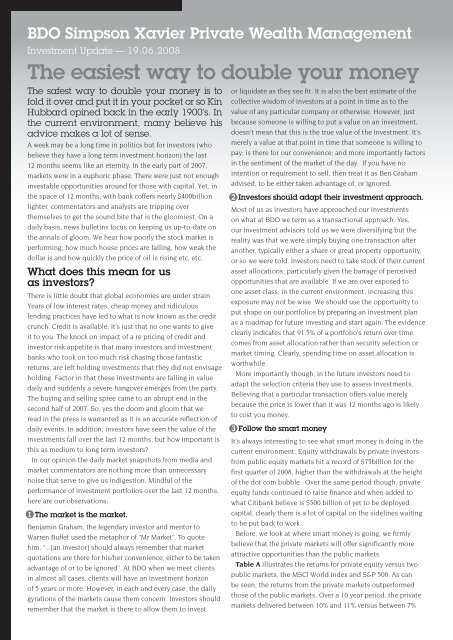

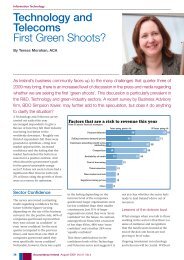



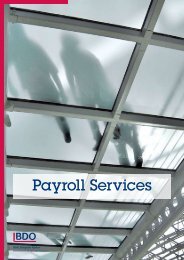

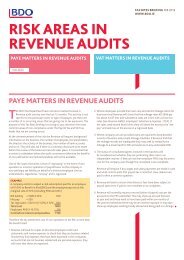
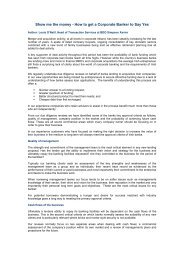
![eii 2013 a5 2pp flyer [web].pdf - BDO](https://img.yumpu.com/39595753/1/184x260/eii-2013-a5-2pp-flyer-webpdf-bdo.jpg?quality=85)

